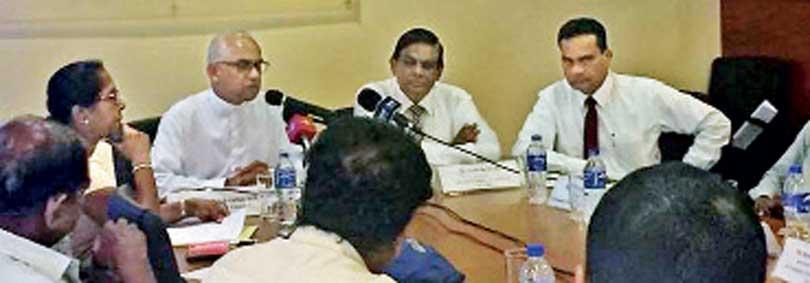23 May 2019 - {{hitsCtrl.values.hits}}

Finance State Minister Eran Wickramaratne in discussion with the business community at the National Chamber of Commerce
The demand for poultry products has plunged as much as by 50 percent in the aftermath of the Easter bombings, which left the country’s HoReCa (hotels, restaurants and café) industry reeling amid fewer tourists and a drop in domestic consumption.
An industry spokesman representing at least 15 poultry farms said that they expect the demand to fall by a further 25 percent in the months to come, as the aftershocks of the Easter carnage is set to reverberate across several sectors of the economy.
According to him, who voiced the industry concerns during a meeting with Finance State Minister Eran Wickramaratne, held at the National Chamber of Commerce, yesterday, Sri Lanka’s poultry industry grew by 25 percent during the first three months of the year, supported by strong tourist arrivals and rising domestic consumption.
In order to withstand the shock from the sudden dip in demand for poultry products in the local market, the industry stakeholders request the government to grant them a rebate on exports, so that they could increase their exports. Poultry is an industry that typically operates in one year cycles and sudden events could not alter its production cycle.
The industry has proposed the government to reduce the cess charged on the importation of maize, a key ingredient used in poultry feed, along with the soybean meal.
While the total effective tax rate on each is 90 percent and 45 percent, respectively, which includes excise duty, PAL, VAT, NBT and cess, the cess component has been raised few times up to Rs.20 a kilo, from earlier Rs.10 a kilo and 10 percent initially.
The higher taxes on maize and insufficient local production of it has sent the prices of poultry produce even higher than some of the regional countries, making the local producers difficult to compete in the international market place.
Hence, the industry has requested the government to reduce the cess to previous 10 percent.Apart from the poultry industry, some of the other small and medium enterprises, such as vegetable and fruit suppliers to the HoReCa industry, are also feeling the brunt of the collapse of the country’s tourism industry.
Tourism accounts for 5 percent of the island nation’s US $ 87 billion economy.
The Finance Ministry estimates the hit on the tourism industry by the Easter bombings at US $ 1.5 billion and the arrivals are expected to drop by 30 percent.Sri Lanka was originally targeting 2.5 million tourists and US $ 5 billion tourism earnings for this year.
25 Nov 2024 1 hours ago
25 Nov 2024 2 hours ago
25 Nov 2024 2 hours ago
25 Nov 2024 2 hours ago
25 Nov 2024 3 hours ago